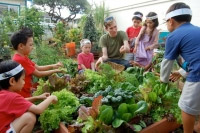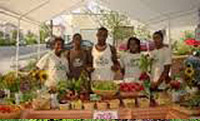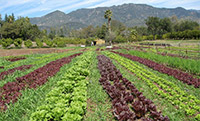Support Sustainable Local Food Systems
 – Your individual Actions make a difference!
– Your individual Actions make a difference!

Support local school and community gardens and join the growing Farm to School movement.
- Support non-profits working on Farm to School and school garden projects
- Grow your own food at home or in a community garden
- Reduce your food waste and learn how to compost your food scraps
Support the movement for healthy, affordable and sustainable food! Support the National Farm to School Network, working to provide children with access to healthy, locally grown school food, and to enhance hands-on learning through classroom education and school gardens.
Check out Jamie Oliver’s Food Revolution or explore the The Edible Schoolyard Project, creating edible education curriculum and promoting gardens as interactive classrooms. Educators can download a Gardening Toolbox of activities at KidsGardening, or explore online tools and recipes to transform school food into healthy meals for kids at The Lunch Box. Consider becoming a FoodCorps service member and work to build and expand school gardens across the United States. Learn more about the Real Food Challenge with a goal of increasing real food served on college campuses or help to inspire a sustainable food dialogue by sharing model university initiatives such as the UC Santa Barbara Edible Campus Program. Encourage students to creatively explore sustainable food systems with Project Localize, a program in which students can interview farmers, create informational artworks, and share their projects at community pop-up shows and with their elected officials.
Start or enhance a school or community garden and apply for a SeedMoney garden grant, or support local community garden projects at ioby.
Take action and reduce your food waste with resources from the I Value Food initiative, or learn how to reduce your “foodprint” through the Think.Eat.Save campaign. Start composting your food scraps at home or at work with tips from Sustainable America. If your business or organization generates excess food, explore pick-up services such as Copia which works to redistribute surplus food to feed people in need.

 – Make conscious purchasing decisions!
– Make conscious purchasing decisions!

Choose to buy seasonal, locally grown, organic food.
- Shop at your local farmers market or join a CSA (community supported agriculture)
- Seek out businesses that offer local and sustainable food choices
- Support local family farms to strengthen regional markets and access to healthy food
From field to fork, an average dinner travels 1,500 miles. But your food doesn't have to travel halfway around the planet. When you buy from local farms, your dollars stay within your community and support local farmers. When you choose organic, you are investing in healthy food and a clean environment.
Visit www.LocalHarvest.org for a farm or market near you. Check out the Eat Well Guide or Fair Food Forager for a list of local and sustainable eating options wherever you go. Promote Wholesome Wave and their innovative programs enabling underserved consumers to make healthier food choices by increasing access to healthy and locally grown food. Get connected with the Slow Food movement to raise awareness about how our food choices can positively influence how food is cultivated, produced and distributed.
Learn more about businesses and organizations that are creating solutions and driving positive change in the food industry. Many business members of 1% For The Planet are supporting sustainable local food systems. Patagonia Provisions recognizes that what and how we choose to eat makes a significant impact on the environment and offers a growing selection of foods that address environmental issues and support local food producers. The Monterey Bay Aquarium Seafood Watch programs helps consumers make better seafood choices for a healthy ocean, offering Consumer Guides and a convenient Seafood Watch App to locate or share businesses that serve sustainable seafood.
Support Farm Aid and their effort to keep family farmers on their land. Farm Aid supports family farmers by inspiring people to choose local food from family farms. Find good food from family farmers and explore Farm Aid’s Homegrown resources to share skills like growing, cooking and food preservation.

 – Let your Voice be heard!
– Let your Voice be heard!

Speak up for your vision of a sustainable local food system.
- Join the policy discussion focused on sustainable local food systems
- Promote food security by engaging the next generation of young farmers
- Encourage food companies to include GMO labels on packages, and shop for non-GMO verified products
Healthy food should be available and affordable to everyone. Policies should be implemented to improve food access and food security, transform the school food program, and educate the public about food choices that strengthen local markets and support sustainable family farms.
Get educated about important sustainable agriculture policy issues through organizations and forums such as the American Farmland Trust, the National Sustainable Agriculture Coalition, and The Land Stewardship Project.
Recent agricultural census figures show the fastest growing group of farmers and ranchers are those over age 65. With growing demand for food production, it is essential to prepare and support the next generation of farmers. Speak out in support of organizations such as the National Young Farmers Coalition, which mobilizes and engages young farmers, and FamilyFarmed, providing farmer training programs across the country and expanding the production and distribution of locally grown food.
Unlike most developed countries, the United States has no laws requiring the labeling of genetically engineered foods. More than 90% of Americans support mandatory labeling of genetically engineered foods in order to make informed choices about what they eat. Learn more about the Just Label It campaign and tell Congress and major food corporations that you have a right to know what is in your food. When you shop, look for non-GMO verified products listed at The Non-GMO Project. If your favorite product is not yet verified, use your voice to encourage company participation and help ensure a non-GMO food supply.


 for the Mailing List
for the Mailing List